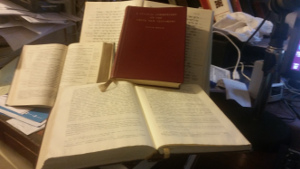Shifting Theology
Last week I was talking about doctrinal distinctives, and today Scot McKnight has a post very close to that topic. He’s more specific, talking about pastors who shift theology. I think he would have done better to illustrate this post with something other than pastors who have become secret atheists, though I know such things happen.
The interesting question I would have is just how much can a pastor shift, and on what issues. From there I’d be wondering how much a leader can shift, for example, a Sunday School teacher. Finally, where might the standard be for members?
Having grown up in the Seventh-day Adventist Church, where I had to affirm a large number of doctrines before baptism, I have experienced the very tight option. After I had left the SDA church, I received a call from someone who wanted to complain about my parents’ positions. They were debating about very minor points and were completely shocked when I pointed out that I didn’t accept either of the positions they were comparing. (The topic was the SDA doctrine of the investigative judgment, which I reject.) To me the issues they raised, and which were critical to them, sounded silly.
In an earlier, Unity, Diversity, and Confusion, I argue that it’s important to have some essential doctrines, but it’s also important both to know what they are and to keep them limited to actual essentials. A church denomination (as opposed to belonging to the universal church), has limited impact, in my opinion. If one finds that one is drifting from the essentials, as understood by that organization, one should cross the street openly and honestly.
Let’s say that a local congregation regards tithing as essential. I think it is just as much a lack of integrity to pastor or lead that church if you don’t accept that essential from their point of view, as it would be to pastor a church after you have lost your faith. (I use this example, because I do not believe tithing applies to Christians.) I would make an exception for those cases in which the congregation is aware of the difference, but accepts the leader in spite of it. In that case, however, I would question whether that doctrine was truly an essential in that particular congregation.
In addition, what precisely is essential? That is not an easy decision either. Are your differences actually on doctrines that are essential? Most congregations have more stated doctrines than are actually essential. Perhaps your shift is one on which you should teach and preach.
I always like to add a caveat here. I’m a publisher, not a pastor. I work for myself. I teach Sunday School, but I’m not on the church board. Thus I speak from the cheap seats. A pastor who has committed his or her life to a calling and to a particular church group has a much more difficult decision to make than I will experience.



A look at the history of the Christian Church will give you some insight.
The Christian Church has always responded when fundamentals of the Christian Faith have come under attack.
It is the reason for every major council meeting from the beginning of the Christian Church.
The First Council of Jerusalem, Council of Nicaea, Council of Constantinople The First Council of Ephesus and more where convened when doctrine, established traditions and or scripture integrity where seriously being challenged. The Councils were convened to settle major dispute and questionable doctrine and or practice in the church.
You might consider same sex marriage, practicing homosexual clergy as two of the most divisive issues the church faces today and there have been some councils formed to address the problem but mostly it is being handled denomination by denomination.
So the Christian Church lacks uniformity and consistency on the issue of essential doctrine.
An additional problem for today’s Christian Church would be what churches calling themselves Christian would be included in any general council. Considering the wide range of orgs. calling them selves Christian (some being cults or so far out of orthodox Christian thinking only they see themselves as christian). Who would decide who is and is not a true Christian Church? It is the price of the Reformation.
All questionable doctrine lead back to the same place and that is the Word of God and the authority it holds. All doctrine leads back to the same place…The Word of God.
So the answer to your question depends on who you ask, although there is general agreement on the person of Christ.
Consider what Luther said when he saw the condition of the church in 1529
Martin Luther to All Faithful and Godly Pastors and Preachers:
Grace, Mercy, and Peace in Jesus Christ, our Lord.
The deplorable, miserable condition which I discovered lately when I, too, was a visitor, has forced and urged me to prepare [publish] this Catechism, or Christian doctrine, in this small, plain, simple form.
Mercy! Good God! what manifold misery I beheld! The common people, especially in the villages, have no knowledge whatever of Christian doctrine, and, alas! many pastors are altogether incapable and incompetent to teach [so much so, that one is ashamed to speak of it]. Nevertheless, all maintain that they are Christians, have been baptized and receive the [common] holy Sacraments. Yet they [do not understand and] cannot [even] recite either the Lord’s Prayer, or the Creed, or the Ten Commandments; they live like dumb brutes and irrational hogs; and yet, now that the Gospel has come, they have nicely learned to abuse all liberty like experts.
O ye bishops! [to whom this charge has been committed by God,] what will ye ever answer to Christ for having so shamefully neglected the people and never for a moment discharged your office?
http://bookofconcord.org/smallcatechism.php